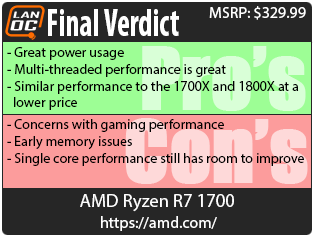Overall and Final Verdict
Following up the 1800X and 1700X coverage with the Ryzen R7 1700 feels a little like I’m just repeating myself because in most aspects this is the same CPU. At this point, most people have had the time to see that the 1700 is an 8 core 16 thread Zen architecture CPU just like the 1700X and 1800X. Where is it different though is it has a lower TDP of 65 compared to the 95-watt TDP of the others. It also doesn’t have an X designation so it has a lower clock speed with the base clock at 3GHz and the Boost clock at 3.7 and not being an X CPU also means it has a smaller XFR that overclocks past the boost clock depending on your cooling and CPU demand. So like those two CPUs, the pros and cons for the R7 1700 are also very similar.
You will find the 1700 especially interesting if you are looking for performance in multi-threaded programs or if you plan on multitasking a lot. This is why I built my last PC around the 6900K, while I do enjoy gaming I do a lot of work from the same computer and even when I’m gaming I have a lot running in the background including streaming from time to time. This is why AMD was really focusing on performance improvements compared to the 7700K when streaming, the IPC of Kaby Lake is still higher than Ryzen and it really shows in some benchmarks, especially gaming. So the R7 1700, like the other Ryzen 7 CPUs, is a huge improvement from AMD but it is better compared to Intel’s X99 based CPUs that were also focused on high multi-threaded performance. If you are looking for pure gaming performance, the 1700 is going to fall behind. That’s not to say that it isn’t just fine for gaming, but if that is your only focus, the 7700K that is priced the same will get you better performance.
Beyond that, I am still waiting for more improvements on the memory front. The Ryzen launch felt a little rushed and it showed when it comes to the refinement of the Motherboard BIOS and overall memory compatibility.
Where the R7 1700 really shined was in its power efficiency, it even idled a touch lower than the also very efficient 7700K. This will be a welcome change for previous AMD users who should see a noticeable improvement on their electric bill. The R7 1700, while not being an X processor with extra XFR performance, still ends up being very close to the other two Ryzen CPUs at stock speeds and it has the same headroom allowing for overclocking that is basically the same. Because of this, the 1700 ends up being the go to value processor in the Ryzen 7 line. That says a lot when the other two are also huge values compared to the 6800k and 6900k that they are positioned against. At $329.99 the R7 1700 does have a lot more competition with the 7700k, but in the end, that decision really comes down to if you would prefer more cores or a higher IPC (instructions per core). Gaming performance from AMD should improve as time goes on, especially with them working with developers like Bethesda.
If you want to go AMD but don’t need the 8 cores and 16 threads, you won’t have to wait long. AMD recently announced Ryzen 5 CPUs are coming in April with 4 and 6 core variants at even lower prices. This spring should be interesting. Or you could skip out on all of that and build a new 1700 based Ryzen system now, assuming you can find a motherboard.


Live Pricing: HERE




